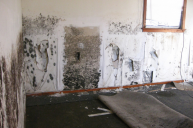A Los Angeles woman, Autumn Clayman, 29, noticed that something was wrong with her apartment. What started as burning sensations in her skin, soon turned into eczema. Worried about her developing condition, she then found out that her apartment's air conditioning units had distributed black mold throughout her home.
Videos by Wide Open Country
It was in February that Clayman began feeling the burning sensations alongside some red marks on her skin.
"I couldn't sleep at night because my skin was so itchy. Not only are you dealing with your skin - your whole body burns and it really affects you," Clayman said, according to the Daily Mail. "I had a burning sensation that started on my face, eyes and neck, followed by visible red patches. Then eczema started on those areas and throughout my skin"
After she developed eczema, an inflammation of the skin that dries it up and makes it itchy, she attempted to cut some food from her diet. She hoped that would fix the issues, but she soon found out there was more to the problem.
"I wasn't 100 percent sure if it was the apartment so I ran through all the scenarios. I cut out a bunch of foods to see if it would change things but it didn't help," she said. Clayman stated that she started to become fatigued and suffer from depressive episodes.
Black Mold Found
She temporarily moved out of her home and stayed with her boyfriend for a couple of weeks. That is when she noticed her symptoms were slowly improving. Therefore, she knew the issue was with her apartment itself. Clayman decided to pay a mold inspector to test her apartment in July. That is where the inspector discovered black mold in the AC units.
"He came out and he said he could tell there was mold present," Clayman said. "They checked the AC units and there was visible mold inside of them. The AC was always blasting so no wonder I would feel so congested when I would wake."
Black mold can grow naturally in AC units as the moist environment favors its growth. For some people, black mold can be dangerous as it causes the immune system to react, with symptoms such as coughing, nasal congestion, wheezing, and chest tightness, among others, according to Cleveland Clinic.
Clayman's landlord apologized and deep-cleaned the apartment. However, after moving back in, Clayman began feeling the symptoms once again. "It wasn't safe for me to live there anymore - it was affecting me physically, mentally, and in my work," said Clayman.
She ended up moving out and replacing all her belongings since the mold had contaminated them all. This ended up costing Clayman $10,000, counting her doctor's appointments and the mold test she made earlier. That said, Clayman now lives happily in her new apartment." I feel like I can focus on healing and taking care of my body," she said.



